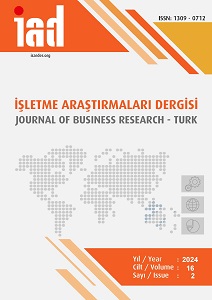Elektronik Ağızdan Ağıza Pazarlamanın Bilişsel Uyumsuzluk Perspektifinden, Tatmin ve Tavsiye Üzerindeki Etkisi
The Effect of Electronic Word of Mouth Marketing on Satisfaction and Recommendation from the Perspective of Cognitive Dissonance
Author(s): Ebubekir Isik, Mehmet GökerikSubject(s): Higher Education , Behaviorism, Marketing / Advertising, Socio-Economic Research
Published by: Orhan Sağçolak
Keywords: Electronic Word of Mouth; Cognitive Dissonance; Consumer Behavior; eWOM;
Summary/Abstract: Purpose – The study's main goal is to understand how students' use of electronic word-of-mouth marketing activities for information gathering before university choice affects cognitive dissonance after choice. Among the issues discussed, particular attention was drawn to the possible adverse and significant effect of electronic word-of-mouth marketing on cognitive dissonance. Design/methodology/approach- The research was conducted using a questionnaire survey on 475 university students. The data obtained were analyzed in detail by structural equation modelling with SPSS 21 and AMOS 20 programs. This analytical framework provides a strong foundation for evaluating the complex relationships between cognitive dissonance, satisfaction and recommendation of eWOM. Findings- The study's findings show that eWOM reduces post-choice cognitive dissonance and that this decrease has a negative and significant effect on satisfaction and recommendation levels. In particular, the increased tendency of delighted individuals to recommend supports the positive effect of eWOM on the choice process. Discussion- In the discussion section of the study, the importance of the findings obtained is emphasized, the effects of eWOM as an information source in the university preference process on the level of cognitive dissonance of students after the university preference process are evaluated, and comparisons are made with previous studies. In this context, it was concluded that students' utilizing eWOM as a source of information during the preference process positively reduced cognitive dissonance after preference. The study's results also suggest that eWOM can effectively manage the university preference process.
Journal: İşletme Araştırmaları Dergisi
- Issue Year: 16/2024
- Issue No: 2
- Page Range: 822-836
- Page Count: 15
- Language: Turkish

